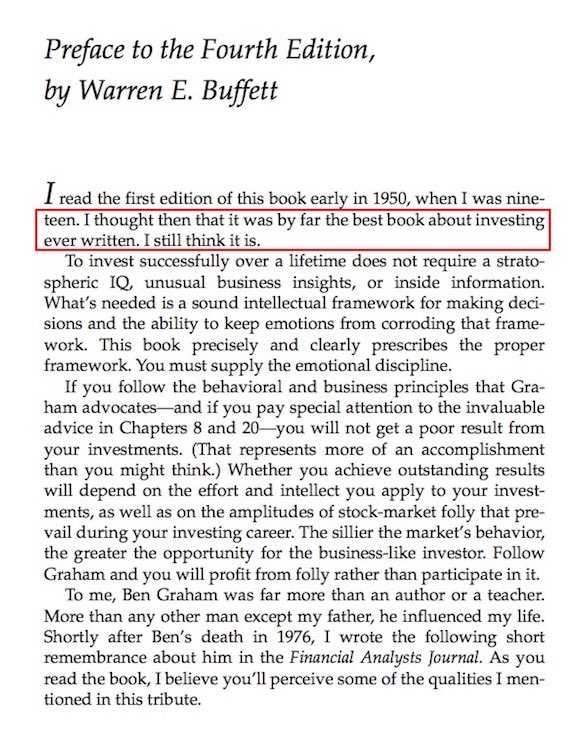Benjamin Graham's students — such as Warren Buffett — have been consistently taking advantage of rampant market inefficiencies.
Benjamin Graham
"In the old days any well-trained security analyst could do a good professional job of selecting undervalued issues through detailed studies; but in the light of the enormous amount of research now being carried on, I doubt whether in most cases such extensive efforts will generate sufficiently superior selections to justify their cost. To that very limited extent I'm on the side of the "efficient market" school of thought now generally accepted by the professors."
Benjamin Graham, Financial Analysts Journal: A Conversation with Benjamin Graham (1976) [PDF].
Please note the qualifier that Graham uses here — "To that very limited extent".
Warren Buffett
Buffett gave a talk in 1984 at Columbia Business School describing how Benjamin Graham's record of creating exceptional investors (such as Buffett himself) is unquestionable, and how Graham's principles are everlasting. The talk is known today as The Superinvestors of Graham-and-Doddsville.
In the talk, Buffett says:
"The common intellectual theme of the investors from Graham-and-Doddsville is this: they search for discrepancies between the value of a business and the price of small pieces of that business in the market. Essentially, they exploit those discrepancies without the efficient market theorist’s concern as to whether the stocks are bought on Monday or Thursday, or whether it is January or July, etc."
"I’m convinced that there is much inefficiency in the market. These Graham-and-Doddsville investors have successfully exploited gaps between price and value. When the price of a stock can be influenced by a “herd” on Wall Street with prices set at the margin by the most emotional person, or the greediest person, or the most depressed person, it is hard to argue that the market always prices rationally. In fact, market prices are frequently nonsensical."
Warren Buffett, Columbia Business School: The Superinvestors of Graham-and-Doddsville (1984) [PDF].
Buffett also says in the talk that the Efficient Market Hypothesis was put forward by "professors who write textbooks"; and like most academic theories, has little meaning for real investors.
"Whether you achieve outstanding results will depend on the effort and intellect you apply to your investments, as well as on the amplitudes of stock-market folly that prevail during your investing career. The sillier the market’s behavior, the greater the opportunity for the business-like investor. Follow Graham and you will profit from folly rather than participate in it."
Warren Buffett, Preface (1986): The Intelligent Investor by Benjamin Graham.
Seth Klarman
Seth Klarman wrote thus in his 2008 preface to Graham's book, Security Analysis:
"Academics tend to create elegant theories that purport to explain the real world but in fact oversimplify it. One such theory, the Efficient Market Hypothesis (EMH), holds that security prices always and immediately reflect all available information, an idea deeply at odds with Graham and Dodd's notion that there is great value to fundamental security analysis... Value investors have no time for these theories and generally ignore them."
Seth Klarman, Preface (2008): Security Analysis by Benjamin Graham.
Peter Thiel
Peter Thiel, co-founder of PayPal and the first investor in Facebook, writes in his book Zero to One:
“In economics, disbelief in secrets leads to faith in efficient markets. But the existence of financial bubbles shows that markets can have extraordinary inefficiencies. (And the more people believe in efficiency, the bigger the bubbles get.) ”
Peter Thiel, Zero to One: Notes on Startups, or How to Build the Future.
James Harris Simons
James Harris Simons — founder of Renaissance Technologies — made some similar observations on EMH during a recent interview, dismissing it as untrue.
George Soros
Soros' Theory of Reflexivity too is a direct repudiation of the Efficient Market Hypothesis.
The Theory of Reflexivity, in fact, supports the argument that market inefficiencies actually increase with increased participation; as Peter Thiel too has stated above.
For the Value Investor, the popularity of theories such as the Efficient Market Hypothesis — and fewer people willing to take advantage of market inefficiencies — simply translates to more opportunity for profit.
Watch Videos
Benjamin Graham
A Value Investing masterclass by Graham and dean Courtney Brown, at Columbia Business School (circa 1955).
The topics covered include investor psychology, investing on Margin, Inflation and Dollar Cost Averaging (DCA).
Buffett vs Munger
One of the few rare instances where Warren Buffett and Charlie Munger have publicly disagreed, the clip below shows what makes Buffett unique and how strong the Graham influence on him continues to be.
Noam Chomsky
Professor Noam Chomsky says that a blind belief in the Efficient Market Hypothesis, bordering on religious fanaticism, caused the housing bubble and financial crisis of 2008.
